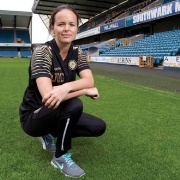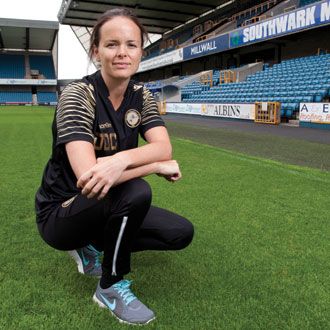
Profile
Dr Jane Simpson
Age 31
Role Club doctor for Millwall FC and GP in South East London
Hours worked per week 4-16 hours per week at Millwall, 20 hours as a salaried GP and between 4-16 of GP locum work per week
13.00
It’s Saturday and the Football Focus theme tune is blaring out from the television. I start getting ready to head down to The Den, the home of Millwall football club, where I am the club doctor. I started working at the club covering academy games while I was completing a sports and exercise medicine master’s degree at Queen Mary University of London and I’ve been club doctor for the past year. This afternoon I’m covering a league match for the first team. I head off with my medical bag and football boots.
13.30
I can hear music pumping from the corridor outside the home team dressing room. The familiar smell of various pre-rubs, Vicks and smelling salts hits me – the masseur and physio are clearly in full flow. It’s great to see that a couple of our under-21 players have been included in the first-team squad today.
I get a ‘Hi Doc’ from the players in the medical room, where I catch up with the physio to see if any players require my attention. I deal with various ailments and queries before the players head out to warm up.
A player was hit on the side of the face by a ball yesterday and is now complaining of ear pain, so I check him out. I work all the home games for the first team and the under-21 team, and provide a weekly clinic for all the players where I treat a lot of general practice conditions, such as upper respiratory tract infections and abdominal pain, as well as sports injuries.
14.00
I run through my equipment: trauma bag, defibrillator, oxygen, Entonox. I set up suture packs in case anyone needs stitches at half-time. The emergency preparation is an important part of the job and all pitch-side doctors attend a two-day advanced resuscitation and emergency aid course for medical situations that could arise at a match.
14.30
The players go to warm up, and I follow them through the tunnel, checking that stretchers, spinal board and collars are there with all their parts. Keeping one eye on the warm-up, I run through emergency action plans with the opposing team’s physio, including the signals we will use to communicate in the event of a problem. Some teams bring a doctor to away games, but it’s not compulsory in our league and today’s team haven’t – so I’m the port of call for both teams if a doctor is needed.
14.55
Back in the changing room there’s a final team talk from the manager, last-minute checks, paracetamol and salbutamol for a couple of players and good-luck handshakes all round. The players pace out of the tunnel and I follow with the rest of the medical team. Before I take my seat I drop off oxygen and Entonox with the four paramedics who sit behind the bench so they can take it onto the pitch if needed. And now for the kick-off.
15.45
Half-time. Fortunately, all our players return to the dressing-room unscathed. Half-time in the medical room can vary, but today I’m pleased not to be dealing with the rib injuries, nosebleeds, facial or scalp lacerations and breathing difficulties that I’ve seen this season.
16.45
The full-time whistle goes. It’s a hard-earned draw and I’m relieved. I’ve always loved watching football, but it’s stressful when you’re the doctor. While the fans cheer, I’m often holding my breath when our defender flies in for a header and misses an opposition’s boot by a whisker.
One of our players has a cheek injury. Luckily it’s bruised rather than broken. I also see a member of the opposition’s staff who felt chest pain during the game. I conclude that it’s musculoskeletal.
Some of the trickiest cases to assess are head injuries. We have guidelines but it’s often difficult to see the mechanism of injury and immediate response of the player from 80 yards away, which highlights the importance of a good history.
18.00
It’s time to head home, but I’ll be back on Monday to run my weekly clinic, before my usual afternoon shift at the surgery. I might get phone-calls throughout the week from players and physios seeking advice, but I don’t mind. When it comes down to it, I never get tired of football.
Pulse July survey
Take our July 2025 survey to potentially win £1.000 worth of tokens












